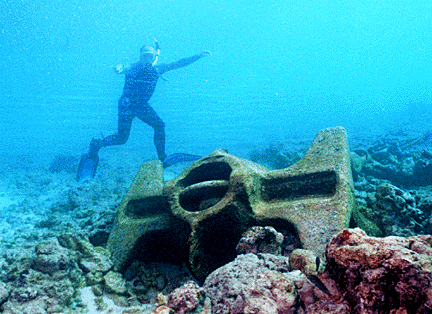

State plans
emergency coral reef
response team
Island reef experts hail
By Lori Tighe
the proposal and call it
long overdue
Star-BulletinIsaac Shaked went snorkeling for octopus off Waikiki Beach and saw a barge's anchor with a steel cable decapitating coral heads.
He spent half the day calling every agency he could think of to help. "They all gave me the runaround. If no one cares, I think, why should I?" Shaked said.
Shaked also discovered the state has no emergency response team for coral reefs -- its most critical natural resource next to drinking water. The state finally found the anchor three weeks later. But it hopes to respond to reef disasters more quickly in the future by forming the country's first coral reef response team.

If approved, the multi-agency team would immediately act in coral crises including ship groundings, oil spills, fishing nets and lost ship anchors. "It's very important," said Jim Maragos, coral reef expert with the East-West Center. "I thought this was long overdue. It's a great idea."Reefs provide the habitat to sustain all marine resources, affecting everything from fisheries to tourism, an $800 million market annually, said William Devick, head of Aquatic Resources in the state Department of Land and Natural Resources.
A rising tide of marine traffic and debris has increased reef crises, Maragos said. Once the reef is destroyed, it takes decades to grow back at an average rate of one inch a year.
"When things happen, people want an immediate response," Devick said "It would be nice to have the resources to do it."
Although the state has 85 percent of America's coral reefs, it has received limited federal money, Devick said.
Most of it goes to Florida and the Caribbean, whose reefs are closer to the nation's Capitol.
But Hawaii hopes to seize upon recent national interest. President Clinton created the U.S. Coral Reef Task Force last June to protect the country's reefs.
David Gulko of the Department of Land and Natural Resources suggested the joint response team at the task force's October meeting in Florida, where he received favorable reaction. The department will lead the team, with the U.S. Fish and Wildlife, National Marine Fisheries Service and the Coast Guard helping.
"The team would be a first," Gulko said. "We've had a number of incidents, the lobster boat grounding at Kure atoll, a log in Hanauma Bay, nets, oil spills -- all with various responses sometimes incorrect, sometimes not."
Hawaii experiences five to six reef damaging events a year, said Gulko, adding that none of the lead agencies can handle coral crises alone.
"It's going to take a combined effort to respond in a quick amount of time," he said. "If you wait, you deal with a dead reef."
Gulko has applied for a federal grant of $53,000 to equip the team.
With the increase in marine tourism, Hawaii will only see more reef devastation like the scene Shaked found off Waikiki, Gulko said. "The reefs," he notes, "are not getting any bigger."